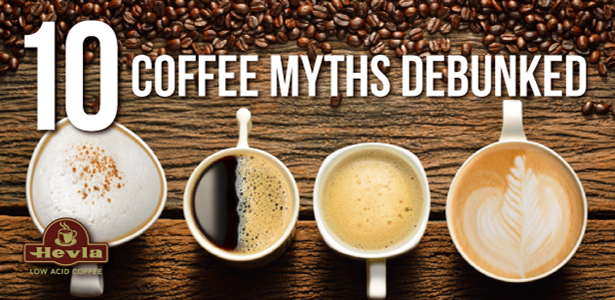
Through the years, we’ve heard so many things said about coffee, sometimes we don’t know which ones are true and which ones are not. Well, here we present to you a few of the myths about coffee and why you should think twice about believing them.
Myth #1 To keep coffee fresh, it should be placed in the freezer or the fridge
Coffee that you drink daily should never be stored in the freezer as it causes condensation whenever you take it in and out of the freezer which will get moisture into the coffee and ruin its flavor. Instead, coffee should be kept in an opaque air-tight container and placed on a cool, dry place like a pantry shelf.
It is, however, acceptable to place coffee in the freezer if you intend to keep this for longer periods. To keep coffee in the freezer, it should be wrapped in air-tight resealable bags with the least amount of air possible. Once you take the coffee out of the freezer, you need to remember not to place it back and instead keep it in your pantry.
Keeping coffee in the refrigerator is an even bigger no-no. Because coffee is porous, it can quickly absorb moisture and odor in the refrigerator which can seriously degrade the quality of your coffee.
Myth #2 Coffee can cause hypertension
Contrary to the popular misconception that coffee can lead to hypertension, research studies have actually shown that there is no significant relation between coffee and hypertension. Although coffee does raise the blood pressure level to a slight degree after it is consumed, this is only for a brief period and in the long run, coffee actually serves to reduce the risks of cardiovascular diseases.
In Japan, a study among men who drank coffee regularly showed that the relationship between coffee and blood pressure levels are inversely proportional. Another study among about 400,000 individuals also presented evidence that daily consumption of coffee did not increase blood pressure levels. A third study that involved 27,000 women even went so far as to say that women who drink up to three cups of coffee daily were 24 percent less likely to acquire cardiovascular illness.
Myth #3 Coffee causes insomnia
Yes, it is true that the caffeine in coffee can cause insomnia, but this effect of coffee widely varies among individuals depending on their sensitivity to caffeine. Although coffee can give you a boost of energy and keep you wide awake, this effect is only momentary as the body has the ability to rid itself of coffee quickly. It is estimated that within eight to ten hours of drinking coffee, 75% of it will have already left the body. So if your tolerance for caffeine is quite low it is best to have your last cup of coffee about ten hours before you go to sleep. But if you belong to the average group of coffee drinkers, drinking coffee six hours before bedtime should present no problem with regard to achieving a good night’s sleep.
Myth #4 There is more caffeine in dark roast coffee than in light roast
This is a widely held belief of coffee that is a real misconception. Unknown to many, coffee loses caffeine during the roasting process, so what this means is that the longer it is roasted, i.e., the darker it is, the less caffeine the coffee contains.
Myth#5 Espresso contains less caffeine than drip coffee
This has been a much-oft asked question and the answers could be quite contradicting. In general, a shot of espresso has less caffeine in it compared to a mug of coffee.
One of the things to consider is that espresso is made of a darker roast of coffee so, as mentioned in Myth #4, it should have less caffeine.
However, if you compare things apples to apples, or to make it more fitting, mugs to mugs, the concentration of caffeine in serving of espresso is greater than that in the same serving of drip coffee. The only reason people would say espresso contains less caffeine is that it is usually taken in smaller servings compared to drip coffee.
Myth #6 Coffee makes you fat
Again, another question that has been asked too often with varying replies.
Coffee alone should not be fattening as it contains virtually zero fats and very minimal calories. However, when you consider all the add-ons people typically put into coffee, then you’ll definitely see how coffee consumption can lead to increased weight.
Some reports have said that drinking black coffee can actually lead to weight loss, to a certain extent. First of all, coffee has a thermogenic effect that means it stimulates the body to generate heat and burn more calories. Another way coffee can aid in losing weight is by suppressing the appetite, while a third is because of its diuretic effect whereby it increases the amount of urine passed thus the body loses more water and a bit of weight.
Myth #7 Coffee cures a hangover
Coffee may jolt a drunk awake, but in no way does it take away the effects of a hangover, namely a bad headache and severe dehydration. When a person gets drunk, the hangover is usually due to dehydration caused by too much alcohol in the blood, and drinking coffee may just worsen it since it has a diuretic effect.
Furthermore, drinking coffee after an over indulgence in alcohol is in fact more dangerous because research has shown that the sobering effect of coffee is only psychological but the real effects of drunkenness is still there, so when a person tries to drive thinking he has sobered up, it heightens the risks of getting into an accident.
Myth #8 Coffee stunts your growth
This is probably the biggest misconception of all regarding coffee which is most likely linked to earlier reports suggesting that coffee causes osteoporosis and lowered bone mass. However, researchers have said that there has been no evidence linking coffee consumption to height, so there is no need to worry about this effect of coffee on children. But, and there is a big BUT mind you, coffee consumption in children should be limited to minimal amounts because kids have lower tolerance of caffeine and could result in magnified effects ulof hyperactivity and sleep deprivation.
Myth #9 Italy produces the best coffee in the world There are many cafes all over Italy, but this does not mean that Italy produces the best coffee because in truth Italy does not grow coffee since its climate is not suitable for it. The only reason people associate coffee with Italy is their love for coffee and their commitment to obtaining the best quality brew.
Myth #10 Coffee will give you ulcers
Because of the high acid content of coffee, it has been commonly mistaken for a cause of stomach ulcers. However, experts have said that there is no know evidence that coffee causes ulcers and that ulcers are in fact caused by a specific bacteria known as Helicobacter pylori and this is treated by antibiotics.
It is important to note, though, that coffee consumption may pose symptoms similar to having stomach ulcers and may also aggravate an already existing ulcer, so cutting back on coffee could potentially ease these discomforts.
The good news, however, is that there is now a growing availability of low-acid coffee that can address the problems of people with acidity problems. Unlike regular coffee, low-acid coffee does not cause a person to experience heartburns, acid reflux and other gastric problems. Drinking low-acid coffee, therefore, will be the answer to the misconception we have mentioned – coffee consumption does not cause stomach ulcers.


Leave a comment